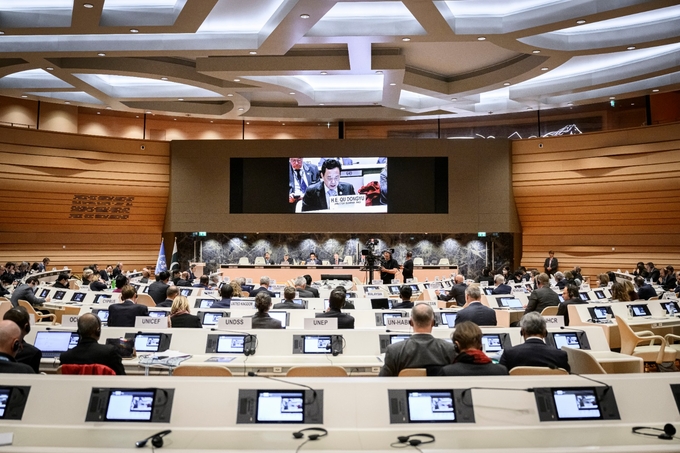November 24, 2025 | 21:10 GMT +7
November 24, 2025 | 21:10 GMT +7
Hotline: 0913.378.918
November 24, 2025 | 21:10 GMT +7
Hotline: 0913.378.918

FAO Director-General QU Dongyu addresses the conference in Geneva, co-hosted by Pakistan and the UN in the wake of last summer’s devastating floods.
The Food and Agriculture Organization of the United Nations (FAO) will continue to play a leading role in transforming Pakistan’s agrifood systems to make them more efficient, inclusive, sustainable and resilient, a challenge that has gained in urgency following recent floods that have devastated the country’s agriculture sector, Director-General QU Dongyu told a UN conference.
Today’s International Conference on Climate Resilient Pakistan in Geneva, co-hosted by the Government of Pakistan and the UN, took place in the wake of last summer’s floods, which had a particularly destructive impact on the Asian country’s agriculture sectors and on the smallholders who rely on agriculture for their livelihood. Pakistan had already experienced devastating floods in 2010 and is considered among the top 10 countries in the world most affected by the climate crisis.
“FAO will continue to provide support to the Government of Pakistan - from immediate response to long-term recovery and resilience building,” Qu told the conference, which saw interventions from a range of global leaders, including UN Secretary-General Antonio Guterres, Pakistan Prime Minister Muhammad Shebaz Sharif and French President Emmanuel Macron.
An estimated 4.4 million acres of farmland - enough to cultivate crops for 14.6 million people – were damaged, and more than 800 000 animals lost in the most recent floods. In all, more than $9 billion in losses were incurred by the agriculture sector. What’s more, over 80 percent of such losses were absorbed by the crop sub-sector, which means that food production will be compromised in the immediate future without substantial support.
FAO’s involvement
The FAO Director-General called for the protection of livestock assets – the last remaining asset for many affected families – as well as for urgent support to farmers to secure the Rabi planting season.
To date, FAO has mobilized over $25 million and has provided over 600 000 affected people with seeds and fertilizers. In addition, livestock vaccination campaigns have been completed in the Balochistan Province and are being finalized in Sindh, while livestock feed distribution will begin shortly, Qu said.
FAO has also been leading preparations for the agriculture, fisheries and livestock section of the Post-Disaster Needs Assessment and has contributed to developing the livelihoods component of the UN’s Resilient Recovery, Rehabilitation, and Reconstruction Framework (4RF).
Under the 4R framework, at least $4 billion are urgently needed to facilitate the immediate recovery of the agriculture sector, and to lay the foundations for lasting resilience.
Other examples of FAO’s role in Pakistan include the provision of technical leadership for the Transforming Indus Basin Initiative, funded by Green Climate Fund. Through this programme, some 1.3 million people in vulnerable areas of the Indus River basin will see improved yields and increased returns of between 30 and 80 percent in their production. In all, about 16 million people will benefit from the programme, either directly or indirectly.
More recently, FAO has begun rolling out a European Union-funded programme to revive water resources in Balochistan. This project seeks to harness the province’s limited water resources and ensure their smarter use in agriculture, alongside improved rangeland management for livestock rearing.
“In Pakistan, we will require massive and sustained investments in climate change adaptation and resilience, especially within the agrifood sectors,” Qu told the conference.
This is crucial to ensure “better production, better nutrition, a better environment and a better life for all – the ‘4 Betters’ that are at the core of the FAO Strategic Framework for the next decade,” Qu said.
(FAO.org)

(VAN) Brazil's COP30 presidency pushed through a compromise climate deal on Saturday that would boost finance for poor nations coping with global warming but that omitted any mention of the fossil fuels driving it.

(VAN) Poultry farmers in the UK have been warned that they could face one of the worst winters yet for bird flu.

(VAN) Prices of main-crop paddy have risen sharply, with jasmine rice hitting 16,100 baht per tonne — the highest level in years.

(VAN) In Brazil, FAO unveiled a series of reports and initiatives showing how sustainable agrifood systems are a solution to the climate crisis.

(VAN) With names like neodymium and dysprosium, rare-earth elements sound exotic — and their perceived scarcity has only added to the mystique.

(VAN) In a new study published in Trends in Biotechnology, researchers used a gene-editing technology called CRISPR to increase a fungus's production efficiency and cut its production-related environmental impact by as much as 61%- all without adding any foreign DNA.

(VAN) A top official in Beijing’s Cop delegation says China is committed to clean energy – but US’s absence is a problem.